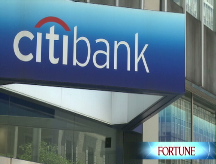Wondering which bank is next
Analysts brace for more bank failures after Wachovia sells out banking assets to Citi; bank stocks plunge after House rejects bailout bill.
NEW YORK (CNNMoney.com) -- Following Citigroup's takeover of Wachovia, the collapse of Washington Mutual and the House's rejection of the bank bailout bill, Wall Street is wondering who's next.
"Clearly we're going to see more bank failures, probably none on the size of whatever we've seen the last couple of days, but we'll see a lot more of them," said Sean Ryan, analyst for Sterne, Agee & Leach.
Ryan said regional banks in the Rust Belt of the upper Midwest - with the exception of TCF Financial Corp. (TCB) because of its strong fundamentals - and banks with heavy mortgage-related investments in the hard-hit areas of California and Florida are vulnerable.
Before the start of trading Monday, Citigroup (C, Fortune 500) said it will acquire the banking operations of Wachovia for $2.2 billion in stock, in a deal brokered by the Federal Deposit Insurance Corp. The FDIC said Wachovia did not qualify as a failed bank.
Washington Mutual (WM, Fortune 500) was seized by federal regulators last Thursday and was bought out by JPMorgan Chase (JPM, Fortune 500).
Shares of many bank stocks were trading lower most of the day Monday but fell even further after Congress rejected the $700 billion bailout of the finance industry.
The S&P 500 Banking Index fell more than 14% while the Dow Jones industrial average plunged nearly 778 points, or 7%, in its worst one-day point loss ever.
Three Ohio banks in particular were the focus of investor concerns, with shares of Cleveland-based National City Corp. and KeyCorp as well as Cincinnati-based Fifth Third Bancorp all plunging.
National City's (NCC, Fortune 500) stock plummeted about 60%. Fifth Third (FITB, Fortune 500) was down nearly 40% and KeyCorp (KEY, Fortune 500) fell more than 25%.
But Ryan of Sterne, Agee & Leach, who covers National City, stood by the bank as being "fundamentally solvent" with a "much higher component of commercial and industrial loans" than some of the recent failures on Wall Street.
Representatives for KeyCorp were not immediately available for comment but spokespersons for the other two firms insisted that their financials were sound.
"We are far better capitalized than WaMu was, or any other major banks," said Kelly Wagner Amen, spokeswoman for National City. "That gives us better flexibility to address the market changes from a position of strength."
Amen said National City raised $7 billion in excess capital back in April. She said National City now has the largest Tier 1 capital ratio of all large U.S. banks and has received "buy" ratings from seven analysts since Friday.
Also, she said the company is less dependent on mortgage-related loans than other banks.
"From a funding and liquidity standpoint, we remain stable," said Amen. "Exposure to residential mortgage markets is significantly smaller than Wachovia. We are a provider of mortgages, but it is not a significant portion of our business."
As for the stock price plunge, Amen said, "We believe that the volatility in our stock price is reflective of the volatility in the finance market as a whole, as a result of unfounded and irrational perception comparing us to Wachovia and WaMu."
Whitney Ellis, spokesman for Fifth Third, refused to comment on the stock price, but he defended his company as having strong fundamentals. In an e-mail to CNNMoney.com, he said that Fifth Third "maintain[s] a level of capital considerably in excess of the government's definition of a well-capitalized institution. And we remain one of the highest rated banks in the U.S."
Other banks with exposure to sagging money market funds also fell sharply Monday, though an analyst said this was a knee jerk reaction.
The Bank of New York Mellon (BK, Fortune 500) and State Street (STT, Fortune 500) fell about 20% Monday, while Northern Trust (NTRS, Fortune 500) fell more than 10%.
Thomas McCrohan, analyst for Janney Montgomery Scott, said two of these banks - The Bank of New York and Northern Trust - recently said they were prepared to inject capital into their money market funds, if necessary.
As a result of the financial crisis, some money market mutual funds, which invest in short-term securities that were billed by most experts as being among the safer investments, have fallen below $1 a share.
McCrohan said the decisions by Bank of New York and Northern Trust to prop up their money market funds may have caused some investors to be nervous, but he thinks the fundamentals for those banks and State Street are strong.
"I think it's totally related to nerves, more than anything else," said McCrohan. "My impression is that they're strong, financially stable companies." ![]()


